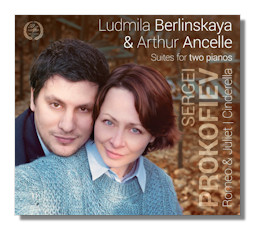
The Internet's Premier Classical Music Source
Related Links
- Prokofieff Reviews
- Latest Reviews
- More Reviews
-
By Composer
-
Collections
DVD & Blu-ray
Books
Concert Reviews
Articles/Interviews
Software
Audio
Search Amazon
Recommended Links
Site News
 CD Review
CD Review
Serge Prokofieff

Ballet Suites for Two Pianos
- Suite from "Romeo and Juliet", Op. 64
(Arrangement by Arthur Ancelle) - Introduction
- Scene
- The Quarrel
- Juliet as a Young Girl
- Masks
- The Montagues and the Capulets
- Gavotte
- The Death of Tybalt
- Romeo Bids Juliet Farewell
- The Death of Juliet
- Suite from "Cinderella", Op. 87
(Arrangement by Mikhail Pletnev) - Introduction
- The Quarrel
- Winter Fairy
- Spring Fairy
- Cinderella's Waltz
- Gavotte
- Galop
- Slow Waltz
- Finale
Ludmila Berlinskaya & Arthur Ancelle, piano duo
Melodiya MELCD1002207 70m
Melodiya is a record label we often associate with reissues of classic recordings by Richter, Gilels, Mravinsky, Rozhdestvensky and many other great Russian artists. But this is a new release and it features two talented pianists who perform as a duo at major concert venues across the globe. Russian-born Ludmila Berlinskaya is the daughter of Valentin Berlinsky, founder of the Borodin Quartet. She studied at the Gnessin and Moscow Conservatories, and had the fortune to have Sviatoslav Richter as both a friend and mentor. French pianist Arthur Ancelle studied music at the École Normale de Musique de Paris "Alfred Cortot". He has had a distinguished keyboard career as well, and has also garnered acclaim for his transcriptions of various orchestral works, including The Sorcerer's Apprentice and these excerpts from Romeo and Juliet.
As most readers know, Romeo and Juliet is one of Prokofiev's most popular works. But when you speak of it these days, you have to clarify what in particular you're referring to. Beside writing the full-length ballet, the composer extracted three suites for orchestra from it, the first two of which have become quite popular. In addition, he fashioned ten piano pieces from the ballet, which are widely performed as well. There have been further transcriptive works drawn from Romeo and Juliet, particularly from the suites: violinist Jascha Heifetz and cellist Gregor Piatigorsky each fashioned pieces for their respective instrument and piano, and Prokofiev acquaintance Vadim Borisovsky transcribed a number of dances from the ballet for viola and piano. And there are many others that only add to the long history of transcriptions from this ballet. On this CD we have more music drawn from Romeo and Juliet, this time for two pianos: four of its ten movements are based directly on the ballet (#1 – Introduction, #3 – Quarrel, #7 – Gavotte, #10 – Death of Juliet) and the others are based on various selections from the suites.
Unlike Prokofiev's own piano transcriptions, this effort by Ancelle attempts to imitate orchestral sonorities. The opening number, Introduction, sounds less lush here than in the ballet but is still a reasonably lyrical account of the music, especially in the latter half when the music turns rhythmic and begins a sort of gentle winding down. Masks (#5) is less percussive and more playful here than in Prokofiev's spikier and more dissonant piano account, and is clearly more orchestral in sound and texture. The Montagues and Capulets (#6) is one of the most interesting efforts here: Prokofiev eliminates the introduction and begins with the famous march theme in his piano transcription, but Ancelle begins with the tense, mysterious trills and sinister brass proclamations from Suite #2 that precede it, effectively emulating the orchestra. Overall, Ancelle's version is quite compelling, and in the end his entire collection must be judged an imaginative and generally convincing arrangement of some of the more memorable moments from Romeo and Juliet. The performances by the duo are splendid on all counts, with well judged tempos, spirited rhythms, nuanced dynamics, and accurate playing.
The same can be said of their performances of Cinderella, a ballet by the way that is nearly as popular as Romeo and Juliet. Here, however, the transcriptions are made by pianist and conductor Mikhail Pletnev, and his arrangements are also imaginative and convincing, and also quite different from the three sets of pieces (19 in all) for solo piano made by the composer. However, they are pretty straight transcriptions of music from various movements of the three orchestral suites Prokofiev made from the ballet. Thus, Pletnev also attempts to provide a more orchestral take on the music, and he largely succeeds. He recorded the work with none other than Martha Argerich for DG, and thus Berlinskaya and Ancelle go up against very formidable competition. Who wins?
Tempos in the Berlinskaya/Ancelle are remarkably similar to those of Argerich/Pletnev, with each of the nine pieces usually clocking in within a few seconds of each other. I would say that Argerich and Pletnev play with a bit more muscle and with slightly more crisp sonorities. But Berlinskaya and Ancelle are always subtle and spirited in their approach, rarely sounding less vital. In one of the big moments, Finale (#9), which contains the ballet's Midnight music, Berlinskaya and Ancelle play with more swagger: glissandos slash with a mixture of glitter and venom, the clock striking midnight builds with subtlety and power, and the music at the close fades with sheer magic. Overall, it's a close call between the two performances, but I would choose the Berlinskaya/Ancelle, in part because the filler on the DG is the Ravel Ma Mere l'Oye in a two-piano arrangement, a good work but at fourteen minutes, it's a comparatively paltry offering alongside the more substantial Romeo and Juliet. The Melodiya CD offers excellent sound and informative notes, which include performer biographies and plentiful background information on the Prokofiev ballets. Highly recommended!
Copyright © 2014, Robert Cummings


















